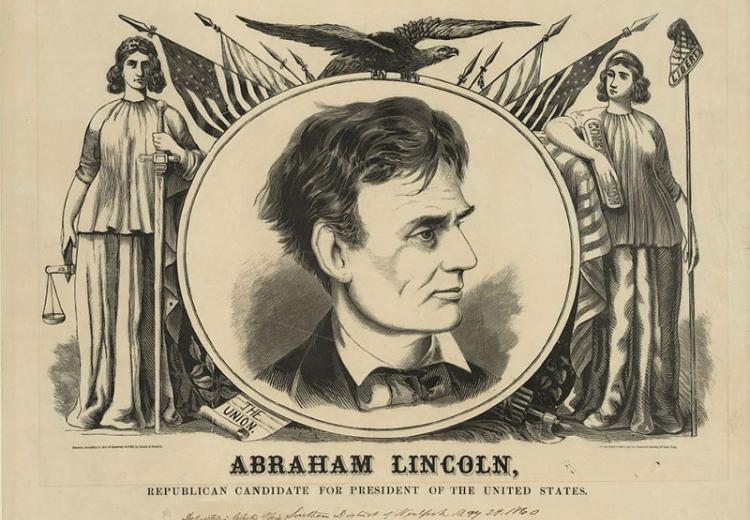Lesson 1: Fragment on the Constitution and Union (1861)—The Purpose of the American Union

Image of 1860 campaign illustration of Republican nominee Abraham Lincoln (with the words "Union", "Liberty", and "Constitution" specifically noted).
"A word fitly spoken by you now would be like 'apples of gold in pictures of silver.'" Alexander H. Stephens, a former Georgia congressman, wrote these words to Abraham Lincoln on December 30, 1860. He quoted from Proverbs 25:11 to persuade Lincoln that a public statement from the president-elect would help greatly in the mounting crisis of the divided country. A student of the Bible in his own right, Lincoln reflected on Stephens's biblical reference and, in a note to himself, used the "apples of gold" reference to clarify the connection between America's constitutional union and the principle of "Liberty to all."
When Lincoln was elected the first Republican president of the United States on November 6, 1860, he received no votes from nine southern states; what Lincoln called in 1858 the "crisis" of the American "house divided" had come to a head. On December 22, 1860, the president-elect wrote Stephens, a former Whig ally in Congress, to assuage his fears about the incoming administration: "Do the people of the South really entertain fears that a Republican administration would, directly, or indirectly, interfere with their slaves, or with them, about their slaves? If they do, I wish to assure you, as once a friend, and still, I hope, not an enemy, that there is no cause for such fears." Stephens, who in February 1861 would be elected Vice President of the Confederate States of America, replied with his December 30 letter, which led Lincoln to jot down what is known as his "Fragment on the Constitution and Union."
This lesson will examine Lincoln's brief but insightful reflection on the importance of the ideal of individual liberty to the constitutional structure and operation of the American union.
Guiding Questions
How did Lincoln understand the principles of the Declaration of Independence as the goal of the American union, secured by the U.S. Constitution?
Learning Objectives
Explain what Lincoln thought was the chief cause of America's prosperity.
Explain the principles of human equality and government by consent expressed in the Declaration of Independence.
Show how the principles of the Declaration represent the aim of the American union and constitution.
Articulate how Lincoln used a verse from Proverbs to symbolize the relationship between the principle of individual freedom and the practice of constitutional self-government.
